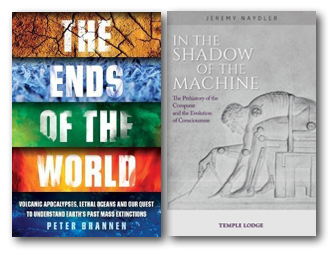
Another year of unusually intensive reading, mainly for my book in-progress on Far West Texas, hence this list is extra crunchy with geology, dinosaurs, Westerns, guns, and technology (yet somehow, like a pair of strawberry puddings amongst the platters of BBQ, Emma and The Prime of Miss Jean Brodie slipped in there…)

1. Tie:
The Ends of the World: Volcanic Apocalypses, Lethal Oceans, and Our Quest to Understand Earth’s Past Mass Extinctions
by Peter Brannen
Waaaaay before mushrooms… but psilocybin-esque. Science journalism at its tiptop best.
In the Shadow of the Machine: The Prehistory of the Computer and the Evolution of Consciousness
by Jeremy Naydler
The maintream mediasphere seems to be overlooking this book, and not surprisingly, for it has been published by a small press that specializes in esoteric subjects. If “esoteric” gives you the readerly “cooties,” well, chill, if you possibly can because Naydler’s In the Shadow of the Machine stands as major contribution to the history of both technology and consciousness. If you’re wading through any of the current best-sellers on the perils of too much screentime and AI and all that, fine and important as some of those works may be (more about Carr below), I would suggest that instead, for a more panoramic and penetrating view of the challenge, start with Naydler.
2. Tie:
Death Comes for the Archbishop
by Willa Cather
Historical fiction closely based on New Mexico and Church history but in all a soaringly lyrical work of empathic imagination. Deservedly one of the grand classics of 20th century American literature.
The Wonderful Country
by Tom Lea
> See my post “Notes on Tom Lea and His Epic Masterpiece of a Western.” The movie vs the novel? An uncooked cold hotdog as to a pile of Texas hot-from-the-BBQ brisket, and with a candied pumpkin for desert.
The Prime of Miss Jean Brodie
by Muriel Spark
Sad, funny, sublime.
Emma
by Jane Austen
Ye olde read-it-by-the-fireside-with-a-cup-of-tea romance. But it’s a more serious work of literary art than it might appear; as a writer of fiction myself I found much to admire in Austen’s Emma. On that note, dear writerly readers, you might find of interest this piece in the Guardian.
3. Tie– and ideally read in tandem:
West of the Revolution: An Uncommon History of 1776
by Claudio Saunt
This will rearrange and reupholster all the furniture in the room in your mind you might call “the United States of America and the whole Roman-Empire-analogy thing.”
> See my review for Literal.
Thundersticks: Firearms and the Violent Transformation of North America
by David J. Silverman
It’s about “agency,” but it’s not about agency. It’s complicatedly complicated. A major contribution to the history of technology, economic history, and the history of North America.
4.
Four Arguments For the Elimination of Television
by Jerry Mander
Uniquely mind-bending.
5.
The Rise and Fall of the Dinosaurs: The Untold Story of a Lost World
by Steve Brusatte
Dino-out! Finally, the whole millions-upon-millions-upon-millions of years of dinosaurs falls into parade-like Ordnung! More fascinating stuff about T-Rex & Co. than I ever thought I would find fascinating! Super nerdy in the friendliest, most readable, and authoritative way. If you read one book on dinos, let it be this one.
6. Tie:
The Alchemy of Air: A Jewish Genius, a Doomed Tycoon, and the Scientific Discovery that Fed the World But Fueled the Rise of Hitler
by Thomas Hager
Magnificent and disturbing.
The Railway Journey: The Industrialization of Time and Space in the Nineteenth Century
by Wolfgang Schivelbusch
Marvelous and mind-bending. My notes here.
7.
Ten Arguments For Deleting Your Social Media Accounts Right Now
by Jaron Lanier
If you know who Jaron Lanier is, you can understand why he, and probably only he can get away with such a title for a commercially published book, one that most people today, and that would include writers with books to promote, would consider hoot-out-loud humbug. But perhaps they would not if [continue reading]
8. Tie:
Amusing Ourselves to Death: Public Discourse in the Age of Show Business
by Neil Postman
Technolopy: The Surrender of Culture to Technology
by Neil Postman
9.
Understanding Me: Lectures and Interviews
by Marshall McLuhan
> See my post, “Notes by Way of a List of Books, Videos, and more.“
10. Tie:
The Future Does Not Compute: Transcending the Machines in Our Midst
by Steven L. Talbott
From my “notes” post March 5, 2018:
Dense yet elegantly lucid, Stephen L. Talbott’s The Future Does Not Compute: Transcending the Machines in Our Midst was published by O’Reilly Associates in 1995, on the eve of the explosion of email, well before that of social media. Astonishingly, it delineates the nature of our now King Kong-sized challenges with technology, when those challenges were, so it now seems, but embryonic. And Talbott writes with unusual authority, grounded in both philosophy and his many years of writing and editing for O’Reilly Media, a prime mover in the economic / cultural juggernaut of a complex, increasingly dispersed from its origin in California’s Santa Clara Valley, that has become known as “Silicon Valley.” CONTINUE READING
Devices of the Soul: Battling for Ourselves in the Age of Machines
by Stephen L. Talbott
11.
The Glass Cage: How Our Computers Are Changing Us
by Nicholas Carr
12.
The Shallows: What the Internet Is Doing to Our Brains
by Nicholas Carr
I’m not where I want to be with my writing here at the end of 2018 and Carr’s works detail many of the reasons why. But I’m moving forward by having deactivated my FB, reduced Twitter to once-a-month-ish courtesy tweet for my Q & A with another writer; generally ignoring LinkedIn, and still– still! thumb cemented in the dike!– refusing to use Whatsapp.
But please know, dear writerly reader, that even as I wend my way, I would not pretend to know what would be best for you. And this the Matterhorn of the challenge of our time: digital technologies that might be zest for one person can prove hazardous for another. One needs both the fortitude and courage to evaluate one’s own path– taking into account one’s own circumstances, talents, weaknesses, predilections, obligations, and goals– then strategize, and restrategize as needed.
My sense is that, primed by Carr’s and others’ works in this vein, our cultural paradigm will definitively shift this winter with the publication of Cal Newport’s Digital Minimalism. Never mind what Newport actually has to say (though as a big fan of his Deep Work, I expect it will be juicy); in simply coining the term “digital minimalism” Newport helps us move towards richer and more effective ways of thinking about how, given our personal and professional goals and well-being, we can optimize our use (or nonuse) of digital technologies.
As I write now in December 2018 the reigning paradigm is the same one we’ve had since forever: if it’s digital and new it must be better; those who resist are old fogeys. It’s a crude paradigm, a cultural fiction. And it has lasted so long time in part because those who resisted either were old fogeys and/or for the most part could not articulate their objections beyond a vaguely whiney, “I don’t like it.”
As an early adopter of digital technologies for decades now (wordprocessing in 1987, email in 1996, website in 1998, blog in 2006, podcast and Youtube channel 2009, bought a first generation iPad and first generation Kindle, self-pubbed Kindles in 2010, etc.), I have more than earned the cred to say, no, my little grasshoppers, no, if it is digital and it is new it might, actually, maybe, in many instances, be very bad for you.
In other words, adopting a given digital technology does not necessarily equate with “progress”; neither does not adopting a given digital technology necessarily equate with backwardness. I so often hear that “there is no choice.” There is in fact is a splendiferous array of choices, and each with a cascade of consequences. But we have to have our eyes, ears, and minds open enough to perceive them, and the courage to act accordingly.
I wish my wiser self could have time traveled to tell my younger self, Be more alert to the ways you invest your time and attention. Be aware that the digital can be, in some ways and sometimes, more ephemeral than paper (and not necessarily ecologically so friendly, either). Social media mavens are not reading the kinds of books you want to write anyway, for they lack the time and the attention span. Social media “friends” may be but are not necessarily your friends; and until you try to communicate with and encounter them outside these networked public spaces, e.g., in the real world, and via one-on-one private communication such as snail mail, telephone, and email, you’re in a hall of mirrors. With almost every app, every platform, some corporation is harvesting your attention and data for shareholder value– and all the while conjuring up new ways to grab even more. Life goes by, zip.

Visit my website for more about my books, articles, and podcasts.

